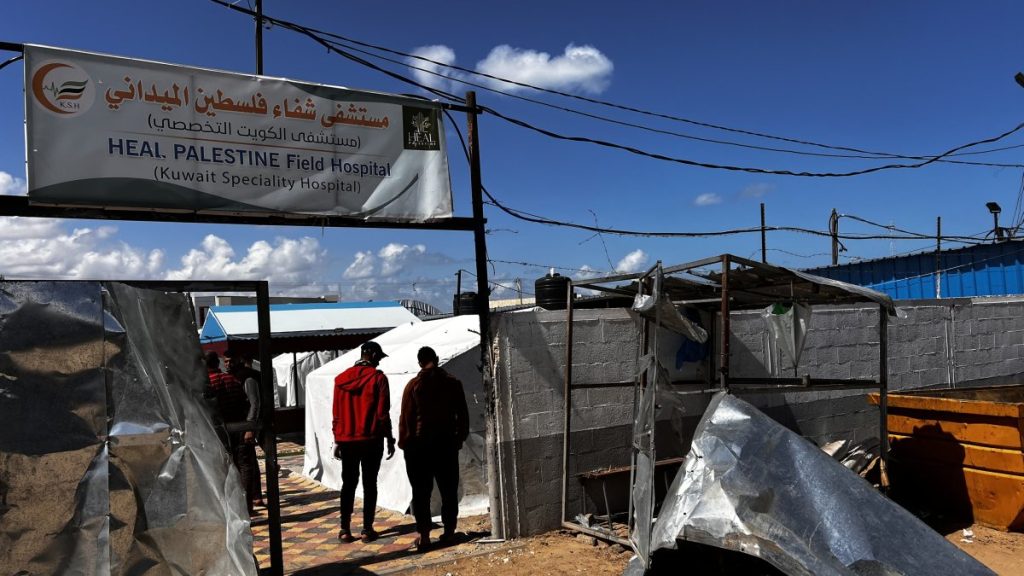Turkish doctor Ibrahim Uygun, who served for a time in Gaza, said there is no difference between living and becoming a martyr for the people there, adding that the occupying force, Israel, knows it cannot defeat them.
Uygun, head of the Department of Pediatric Surgery at the Faculty of Medicine at Kütahya University of Health Sciences, spoke to Anadolu Agency (AA) about his experiences and observations during his stay of over two months in Gaza.
He said he had wanted to go to the region since Israel’s attacks on Gaza began in October 2023 and finally managed to enter Gaza after an eight-month wait, facilitated by the Palestinian Doctors Association.
“We entered Gaza through the Kerem Abu Salem (Kerem Shalom) border gate, which is controlled by Israeli occupation forces, under the auspices of the World Health Organization (WHO) and through the European Palestinian Doctors Association,” Uygun explained.
Upon entering Gaza, Uygun said they were met with a city in complete devastation, which deeply affected them.
“Many TV channels show destroyed buildings. Don’t think these are selectively chosen images – they’re not. What you see is the reality, and it reflects all of Gaza. There’s hardly a stone left upon another. Very few animals remain. You won’t find a house, shop or vehicle that hasn’t been destroyed. What affected me most was the people’s resilience and faith in their creator. During the two months and five days I spent there, I never saw anyone crying over a destroyed home, a burned shop or a ruined car,” Uygun said.
“I didn’t see anyone wailing or rebelling after losing their loved ones. The faith and worldview of the people of Gaza are truly strong. They live with a real understanding that worldly possessions are temporary. They will never abandon Gaza – and the occupying forces know this well,” he added.
He also noted that children in Gaza are not afraid of the attacks, even though many of them are killed while playing outside during the day.
“At the hospital where I worked, Al-Ahli Baptist Hospital, we received many martyrs, and more kept arriving. Most of the burial shrouds were bloodstained, and funeral prayers were performed with the bodies laid on the ground. I used to get emotional. Seeing this, my Palestinian colleagues would say, ‘Why are you crying? There’s nothing to cry about here. They were martyred by the bullets and shrapnel of the occupation forces. They did not die in vain; they are in heaven now. There’s no reason to cry – just say Alhamdulillah,’” Uygun recalled.
He visited hospitals in both southern and northern Gaza and said the world is talking about Gaza because of the scale of the atrocities in such a small place.
“The people of Gaza love life deeply, but they are not afraid of death. The occupying forces know this. They know they can’t defeat these people. Some even told me they desire martyrdom. You can’t defeat that kind of belief with weapons, bombs or drones,” he said.
Uygun also pointed out that major hospitals in Gaza have been destroyed beyond repair, with Shifa Hospital in the north being the most significant among them.
He said Al-Ahli Baptist Hospital does not have a working MRI machine. Gaza has only two functioning CT scanners, one at Nasr Hospital in the south and the other at Al-Ahli. Despite being a small facility, Al-Ahli is being used as a trauma center out of necessity, as is Nasr Hospital.
Uygun noted that even during the cease-fire, Israeli drones flew overhead daily, killing three to five Palestinians each day. He witnessed many killings and shootings, even during the so-called cease-fire.
“When the cease-fire ended, drone activity resumed during the day and attacks intensified. The latest wave of attacks began with a full assault. On the first night, 412 people were killed, and the death toll later rose to 500. In a single night, around 500 people were martyred. The attacks are still ongoing, and unfortunately, the situation is getting worse. Hospitals are being hit in a deliberate and systematic way,” he said.
Uygun emphasized that the long-term lack of food and humanitarian aid has severely affected people’s health.
“Our friends showed us before-and-after photos of people, with weight losses of 20 to 30 kilograms (44 to 66 pounds). There is simply nothing to eat –people are starving. Women in Gaza are remarkably strong and proud. They never beg for aid from outsiders. Even if they are living in tents or ruins and washing clothes with carried water, they still appear in clean clothes and take great care of their children.”
“For Gazans, there is no difference between living and becoming a martyr. They live with that belief,” Uygun said, adding that their strength and faith are instilled from childhood.
He also stressed that building fully equipped health care facilities in Gaza would require time and financial resources, something only possible after peace is declared.


